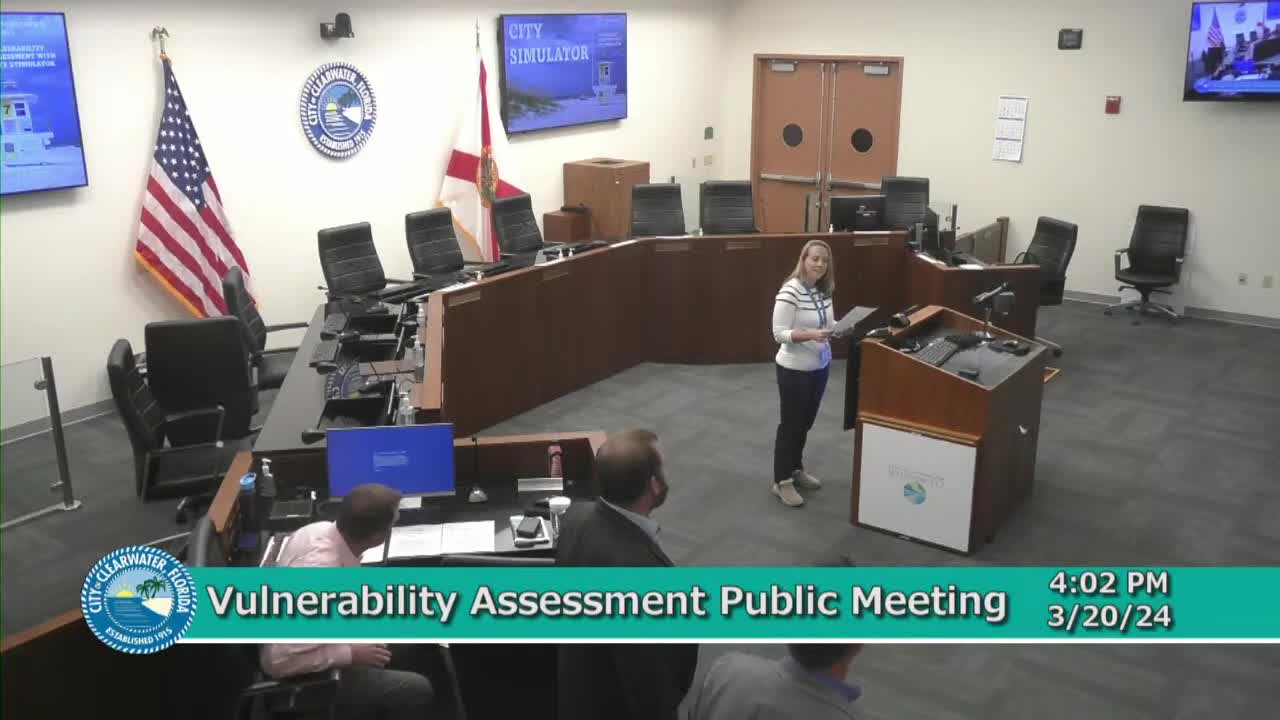Clearwater Launches Comprehensive Vulnerability Assessment Using Geospatial Tool
March 21, 2024 | Clearwater, Pinellas County, Florida

This article was created by AI summarizing key points discussed. AI makes mistakes, so for full details and context, please refer to the video of the full meeting. Please report any errors so we can fix them. Report an error »

City officials gathered on March 20, 2024, to discuss Clearwater's groundbreaking vulnerability assessment project, a key initiative aimed at addressing climate impacts on the community. The meeting, led by Project Director Daniel Parsons and Deputy City Engineer Jeremy Brown, highlighted the city's innovative approach to understanding future challenges related to heat and flooding.
The assessment, funded through Florida's Resilient Florida program, employs a sophisticated geospatial tool that simulates Clearwater's growth over the next 80 years. This model uses census data to track population movements, including residents commuting to work and tourists visiting local beaches. By analyzing these patterns, the city aims to create a realistic picture of how climate events could affect daily life and infrastructure.
"This is a planning tool that will help us test different simulations into the future," Parsons explained. The project is designed to integrate with existing sustainability initiatives and provide valuable data for future grant applications, including those from FEMA.
The meeting also emphasized the importance of collaboration, with a project action team comprising city staff and a technical advisory committee that includes regional experts in sustainability and transportation planning. This diverse input ensures a comprehensive understanding of Clearwater's unique challenges.
As the project nears completion, city officials are eager to share preliminary findings and engage the public in discussions about the future of Clearwater. The vulnerability assessment represents a proactive step towards building a resilient community capable of adapting to the realities of climate change.
The assessment, funded through Florida's Resilient Florida program, employs a sophisticated geospatial tool that simulates Clearwater's growth over the next 80 years. This model uses census data to track population movements, including residents commuting to work and tourists visiting local beaches. By analyzing these patterns, the city aims to create a realistic picture of how climate events could affect daily life and infrastructure.
"This is a planning tool that will help us test different simulations into the future," Parsons explained. The project is designed to integrate with existing sustainability initiatives and provide valuable data for future grant applications, including those from FEMA.
The meeting also emphasized the importance of collaboration, with a project action team comprising city staff and a technical advisory committee that includes regional experts in sustainability and transportation planning. This diverse input ensures a comprehensive understanding of Clearwater's unique challenges.
As the project nears completion, city officials are eager to share preliminary findings and engage the public in discussions about the future of Clearwater. The vulnerability assessment represents a proactive step towards building a resilient community capable of adapting to the realities of climate change.
View full meeting
This article is based on a recent meeting—watch the full video and explore the complete transcript for deeper insights into the discussion.
View full meeting